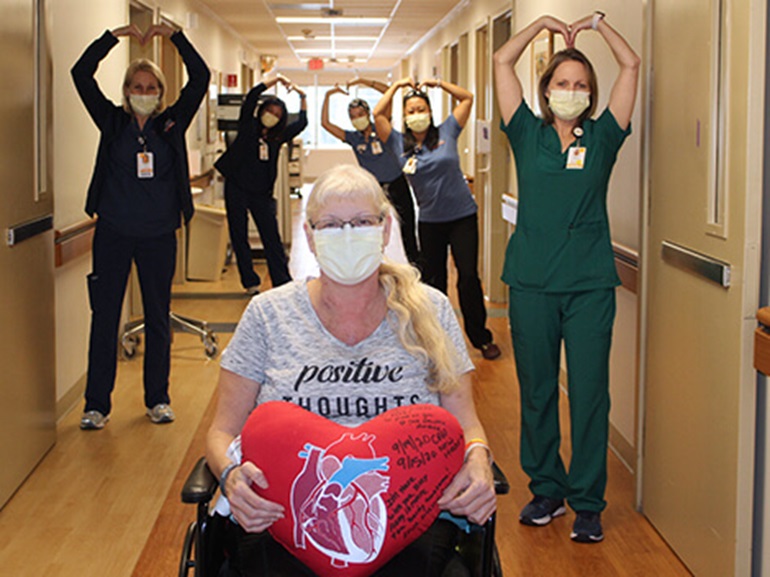Debra's Story

Southern California native Debra Harris, 60, was a busy woman for much of her life. She was a mother, grandmother, realtor, caregiver for her brother and owned several businesses with her husband. Describing herself as “the glue” that held her large extended family together, Debra spent her spare time singing in the church choir. It was during rehearsals when she began to notice that her ability to hold long notes was diminishing due to shortness of breath. She had previously been diagnosed with bronchitis and asthma, but found that the steroids she had been prescribed made it worse.
Finally, after continuing to experience increasing difficulty in breathing, her husband took her to the emergency room. Debra was given a chest X-ray and doctors quickly realized that her condition was more serious than anyone realized – Debra had congestive heart failure (CHF) and her heart was only functioning at about 20 percent. She suspected that a case of swine flu 10 years ago that left her bedridden for eight weeks may be what triggered the CHF, leading to a slow cardiac decline that rendered her exhausted and immune-compromised.
After ongoing monitoring, medications and procedures over the next few years, Debra’s physicians ultimately determined that a heart transplant was her best hope. In September 2020, Debra received a new heart at Cedars-Sinai Comprehensive Transplant Center. Her physicians then recommended California Rehabilitation Institute (Cal Rehab) as the next step in her recovery.
Debra admits that she was scared to come to Cal Rehab, saying that “I didn’t know what I was in for.” She had experienced severe delirium due to anesthesia in the hospital, which left her fearful and miserable. To complicate matters, Debra began to have seizures. That, combined with the fact that she was completely dependent on others, meant Debra had a long way to go toward her goals of standing, walking and handling her self-care independently.
Arriving at Cal Rehab, Debra said, was the key turning point in her recovery. “It gave me hope that I could walk again,” she said, adding that her care team “made me feel very warm and welcomed which gave me peace and encouragement.”
Occupational therapists worked with Debra on daily living activities such as taking her first shower in months while physical therapists helped her regain strength and stamina so that she could slowly begin to stand and walk again. In these sessions, Debra also used a stationary bike, which she found relaxing, and worked on navigating stairs and getting in and out of a car. Debra also enjoyed her time with her recreation therapists playing Yahtzee. “The therapists explained everything. They made me feel at ease and made therapy fun, not just a task,” said Debra. “The team very much exceeded my expectations. Everyone was so encouraging.”
After 22 days at Cal Rehab, Debra was ready to continue her recovery at home with home health care. She was particularly excited to hold her grandchildren again, after months of being unable to do so. She credits her family with providing ongoing love and support, even selling 2,000 t-shirts as a fundraiser to help with medical costs.
Debra has high praise for her entire Cal Rehab care team, stating “They treat everyone like family. It’s a comforting, nurturing place for you to heal and grow emotionally and physically.”